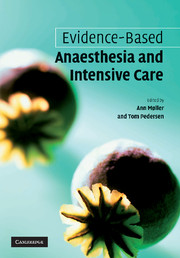Book contents
- Frontmatter
- Contents
- Foreword
- Contributors
- 1 Introducing evidence-based anaesthesia
- 2 How to define the questions
- 3 Developing a search strategy, locating studies and electronic databases
- 4 Retrieving the data
- 5 Critical appraisal and presentation of study details
- 6 Outcomes
- 7 The meta-analysis of a systematic review
- 8 Bias in systematic reviews: considerations when updating your knowledge
- 9 The Cochrane Collaboration and the Cochrane Anaesthesia Review Group
- 10 Integrating clinical practice and evidence: how to learn and teach evidence-based medicine
- 11 Involving patients and consumers in health care and decision-making processes: nothing about us without us
- 12 Evidence-based medicine in the Third World
- 13 Preoperative anaesthesia evaluation
- 14 Regional anaesthesia versus general anaesthesia
- 15 Fluid therapy
- 16 Antiemetics
- 17 Anaesthesia for day-case surgery
- 18 Obstetrical anaesthesia
- 19 Anaesthesia for major abdominal and urological surgery
- 20 Anaesthesia for paediatric surgery
- 21 Anaesthesia for eye, ENT and dental surgery
- 22 Anaesthesia for neurosurgery
- 23 Cardiothoracic anaesthesia and critical care
- 24 Postoperative pain therapy
- 25 Critical care medicine
- 26 Emergency medicine: cardiac arrest management, severe burns, near-drowning and multiple trauma
- Glossary of terms
- Index
8 - Bias in systematic reviews: considerations when updating your knowledge
Published online by Cambridge University Press: 05 September 2009
- Frontmatter
- Contents
- Foreword
- Contributors
- 1 Introducing evidence-based anaesthesia
- 2 How to define the questions
- 3 Developing a search strategy, locating studies and electronic databases
- 4 Retrieving the data
- 5 Critical appraisal and presentation of study details
- 6 Outcomes
- 7 The meta-analysis of a systematic review
- 8 Bias in systematic reviews: considerations when updating your knowledge
- 9 The Cochrane Collaboration and the Cochrane Anaesthesia Review Group
- 10 Integrating clinical practice and evidence: how to learn and teach evidence-based medicine
- 11 Involving patients and consumers in health care and decision-making processes: nothing about us without us
- 12 Evidence-based medicine in the Third World
- 13 Preoperative anaesthesia evaluation
- 14 Regional anaesthesia versus general anaesthesia
- 15 Fluid therapy
- 16 Antiemetics
- 17 Anaesthesia for day-case surgery
- 18 Obstetrical anaesthesia
- 19 Anaesthesia for major abdominal and urological surgery
- 20 Anaesthesia for paediatric surgery
- 21 Anaesthesia for eye, ENT and dental surgery
- 22 Anaesthesia for neurosurgery
- 23 Cardiothoracic anaesthesia and critical care
- 24 Postoperative pain therapy
- 25 Critical care medicine
- 26 Emergency medicine: cardiac arrest management, severe burns, near-drowning and multiple trauma
- Glossary of terms
- Index
Summary
This chapter is divided into two sections: (1) Bias within single studies and (2) bias between studies in systematic reviews. The general concept of bias is discussed in the beginning. Particular forms of bias like selection, attrition or detection bias are presented together with potential answers to the problem. The association between potential bias and trial quality is illustrated, as well as the impact of realisation versus reporting and the assessment of trial quality. The first part ends with special considerations regarding bias and quality assessment in diagnostic studies. The main part related to bias at the between-study level contains a description of publication bias and related biases, how it happens, how it may be prevented, and how to deal with it. Further biases like those resulting from choice of databases, biased inclusion criteria, differentially delayed publication, publication language and analysis are also discussed.
Introduction
Traditional narrative reviews were frequently criticised for giving a potentially biased view of a topic [1]. Systematic reviews aim at avoiding many of the biases contained in traditional narrative reviews, but nevertheless there is still potential for numerous biases even in elaborate systematic reviews.
Dealing with biases and compiling systematic reviews belong together. A well-known definition of systematic reviews says [2]: the application of scientific strategies that limit bias by the systematic assembly, critical appraisal and synthesis of all relevant studies on a specific topic. Noteworthy this definition already contains the term bias.
Keywords
Information
- Type
- Chapter
- Information
- Evidence-based Anaesthesia and Intensive Care , pp. 61 - 76Publisher: Cambridge University PressPrint publication year: 2006
Accessibility standard: Unknown
Why this information is here
This section outlines the accessibility features of this content - including support for screen readers, full keyboard navigation and high-contrast display options. This may not be relevant for you.Accessibility Information
- 1
- Cited by
